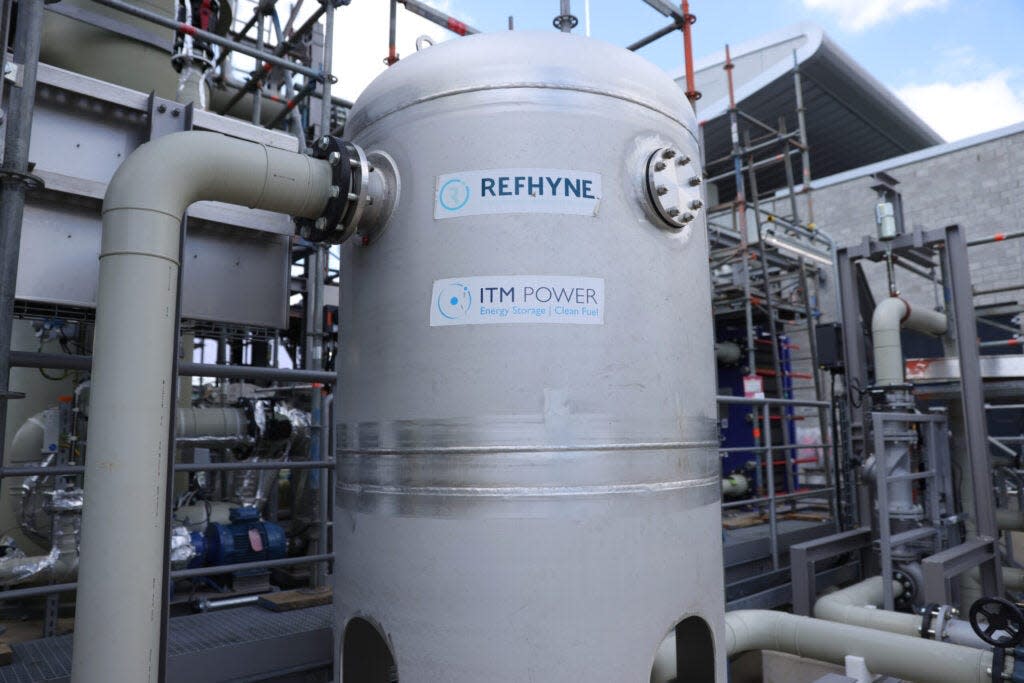Delaware to become the next hub for hydrogen power. Here's what to know

The next decade may see Delaware becoming a cornerstone of energy transformation on the East Coast, as stakeholders prepare for hydrogen power to take hold in the region.
On Oct. 13, the U.S. Department of Energy announced that Delaware, Pennsylvania and New Jersey will be the recipients of $750 million in federal funding to build out the Mid-Atlantic Hydrogen Hub over the next nine years.
The funding is part of a national initiative to transition away from fossil fuels in heavy industrial uses. Government officials and researchers have touted the promising nature of hydrogen power in limiting harmful emissions, but skepticism remains among environmentalists.
Ready or not, the hydrogen hubs are coming to Delaware. Here's what you need to know.
What is hydrogen power?

Hydrogen power is considered a secondary energy source because it requires an input of energy to produce the power.
There are many different categories of hydrogen power, depending on what is used to produce it. The two main types to know are "green hydrogen," which uses only renewable energy, and "gray hydrogen," which uses natural gas and emits methane.
More: Why the Sussex County Council is being sued over a solar farm permit
Gray hydrogen accounts for 1 percent of all energy consumption in the U.S.
The Biden administration has created opportunities for federal funding to develop hydrogen hubs across the country in hopes of weaning industries off of fossil fuels. The Bipartisan Infrastructure Law of 2021 allocated around $8 billion for regions across the country to develop "hubs" of hydrogen power projects.
This month seven hubs were awarded federal funds from the Department of Energy, including the Mid-Atlantic hub, which Delaware is a part of. Altogether, the hubs aim to eliminate 25 million metric tons of carbon dioxide emissions each year, adding up to around one-third of the country's climate goals.
Is hydrogen power dangerous?
Depending on how hydrogen power is made, it can pose certain threats to the climate. Environmental advocates like the Delaware Riverkeeper Network and the Sierra Club have expressed disapproval of the recent local investments in the technology.
"The last thing the Delaware River Watershed needs is the development of hydrogen and the pollution it will bring," said Tracy Carluccio, deputy director of the Delaware Riverkeeper Network, in a press release.
Concerns related to the price of establishing the hubs, excessive water usage and the potential pollution that comes from them are among the issues raised by environmentalists.
Collin O’Mara serves as the chair of the Mid-Atlantic Hydrogen Hub Board and was heavily involved in the drafting and submission of the application to the Department of Energy. He conceded that many of the concerns regarding hydrogen power come from a warranted place.
"A lot of the hydrogen production so far has been pretty dirty in this country," said O'Mara, who formerly led Delaware's environmental department. "We're trying to make sure that we show it can be done the right way."
What is a 'hub'?
Although "hubs" are the recipients of the federal funds for hydrogen projects, they consist of more than just the plants themselves. They essentially mean setting up regional economies based around the production and use of hydrogen power by collaborating with local energy companies to power hydrogen production, consumers to use the hydrogen power at an economically competitive cost, academia and local governments to conduct research and outreach amongst other stakeholders.
In Delaware's case, the hub consists of partnering with private companies like DuPont, the Delaware City Refinery's owner PBF, DART, Chesapeake Utilities and the University of Delaware and nonprofits for workforce development.
More: Delmarva Power announces a decrease in home heating bills for customers this fall, winter
Elected officials like Delaware Sen. Tom Carper have been heavily involved in the application process, hoping to bring the future of clean energy to the First State.
"The green light of the Mid-Atlantic Hydrogen Hub is wonderful news for the future of Delaware, our nation and our planet," Carper said. "MACH2 will allow Delaware to cement our status as a national leader in clean hydrogen production and help our nation achieve our clean energy goals."
What is MACH2?
The Mid-Atlantic Hydrogen Hub (MACH2) is one of the seven hubs awarded $750 million in federal funding. It consists of multiple hydrogen power projects that will span Pennsylvania, New Jersey and Delaware.
The plan for MACH2 is to generate "green hydrogen," powered by only renewable energy like wind or solar. Using these processes, MACH2 plans to reduce carbon emissions by around 1 million metric tons per year.
O’Mara explained that hydrogen power is not planned to be used for residential electricity, but rather for sectors like steel, cement and public transportation that are generally harder to electrify.
“The goal is to produce zero-emission hydrogen across the region to repower our industrial processes and some of our heavy transportation needs,” O’Mara said. “Also to improve air quality across the region, particularly in some of the communities that have been hit hardest by environmental injustice over the years.”
Across all three states, MACH2 is expected to generate around 20,800 union jobs - 14,400 in construction and 6,400 permanent positions.
Where will the projects be?
Exact details are still being worked out, but according to O'Mara, many local private companies have shown interest in getting involved in Delaware's future hydrogen hub.
The most likely location for the hydrogen plant will be at the site of the Delaware City Refinery, which plans to use renewable energies to make the hydrogen power. Chesapeake Utilities has also expressed interest in building a solar field in Georgetown to fuel another hydrogen plant.
More: Wilmington council tables vote on ordinance that would remove residency law for new hires
Ideally, the hydrogen power produced would require no fossil fuels and be used in sectors that would otherwise be hard to de-carbonize such as public transportation and local industrial operations.
When will this take place?
The $750 million will be doled out to the MACH2 board in five phases between now and 2032. Phases include community engagement, design and development, financing and the construction process.
How will this impact consumers?
There are no plans for the hydrogen power to be used for residential purposes. The main focus will be on industries with heavy emissions such as transportation and manufacturing, so it shouldn’t have an impact on people’s bills.
Where can I learn more?
There will be chances for the public to weigh in on this issue. The Governor's Energy Advisory Committee will be holding three public engagement sessions in November, with more planned to be announced.
Wednesday, Nov. 1, Dover Public Library, 35 Loockerman Plaza, Dover
Monday, Nov. 6, Route 9 Library & Innovation Center, 3022 New Castle Ave., New Castle
Wednesday, Nov. 15, CHEER Community Center, 20520 Sand Hill Road, Georgetown
These meetings are typically held to discuss more general topics pertaining to the state's energy landscape.
Anyone interested in learning more about the region's future in hydrogen power specifically can attend the U.S. Department of Energy's virtual community briefing at 6:00 p.m. on Oct. 25.
Contact Molly McVety at mmcvety@delawareonline.com. Follow her on Twitter @mollymcvety.
This article originally appeared on Delaware News Journal: Delaware to partake in "green" hydrogen hub. Here's what that means.

